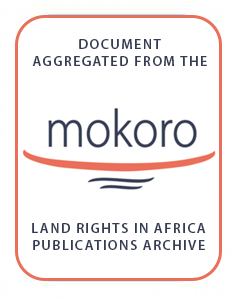Gender Aspects of Land Reform: Constitutional Principles
A pocket sized booklet published to make a significant contribution towards creating a just, fair and equitable society in which women’s land rights are more strongly recognised and promoted. Contains a series of issues and principles: discrimination on the basis of sex; land tenure reform; land ownership; trust land; rights of inheritance; succession and matrimonial property; land distribution and resettlement schemes; land markets; institutional arrangements; the National Land Policy; conclusion.




